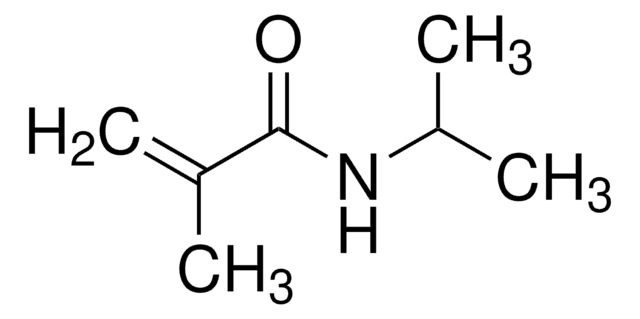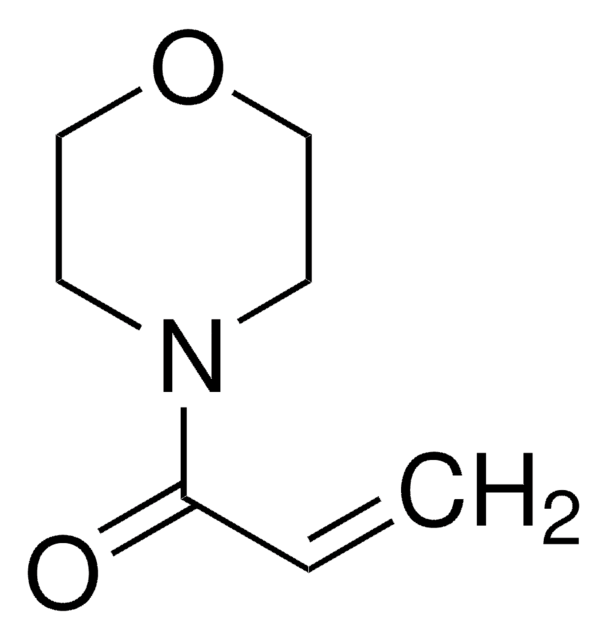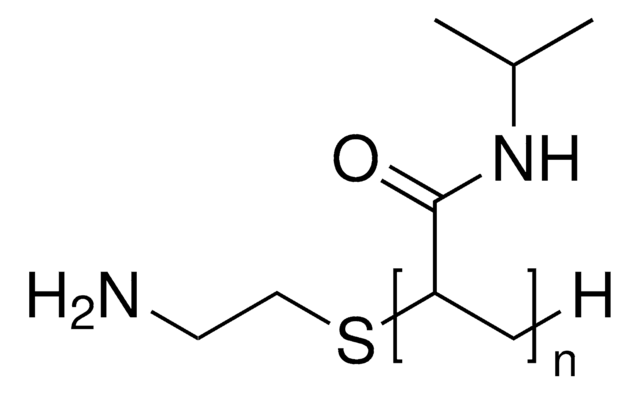All Photos(2)
About This Item
Linear Formula:
H2C=CHCONHCH(CH3)2
CAS Number:
Molecular Weight:
113.16
EC Number:
MDL number:
UNSPSC Code:
12162002
PubChem Substance ID:
NACRES:
NA.23
Recommended Products
Assay
97%
bp
89-92 °C/2 mmHg (lit.)
mp
60-63 °C (lit.)
SMILES string
CC(C)NC(=O)C=C
InChI
1S/C6H11NO/c1-4-6(8)7-5(2)3/h4-5H,1H2,2-3H3,(H,7,8)
InChI key
QNILTEGFHQSKFF-UHFFFAOYSA-N
Looking for similar products? Visit Product Comparison Guide
Related Categories
General description
N-Isopropylacrylamide (NIPAM) is a biocompatible monomeric unit that can be used in the formation of stimuli responsive polymers due to its temperature sensitive properties, which include temperature-based volumetric and phase changes. These properties change when the temperature of the solution reaches a lower critical solution temperature (LCST).
Application
Monomer used in the preparation of thermally sensitive, water-swellable hydrogels.
NIPAM can be used to prepare poly(NIPAM) based thermosetting polymers, which can be used for a variety of applications such as tissue engineering, cell culture, biomedical coating, drug delivery, and muscle regeneration.
Signal Word
Danger
Hazard Statements
Precautionary Statements
Hazard Classifications
Acute Tox. 4 Oral - Eye Dam. 1
Storage Class Code
11 - Combustible Solids
WGK
WGK 3
Personal Protective Equipment
dust mask type N95 (US), Eyeshields, Gloves
Certificates of Analysis (COA)
Search for Certificates of Analysis (COA) by entering the products Lot/Batch Number. Lot and Batch Numbers can be found on a product’s label following the words ‘Lot’ or ‘Batch’.
Already Own This Product?
Find documentation for the products that you have recently purchased in the Document Library.
Customers Also Viewed
Meunier, F., Elaissari, A.
Surfactant Science Series, 115, 117-117 (2003)
Temperature-responsive polymers for cell culture and tissue engineering applications
Switchable and Responsive Surfaces and Materials for Biomedical Applications, 32(5), 203-233 (2015)
Bio-Instructive Scaffolds for Muscle Regeneration: NonCrosslinked Polymers
Bio-Instructive Scaffolds for Musculoskeletal Tissue Engineering and Regenerative Medicine, 34(9), 161-186 (2017)
Saunders, B.R.
Surfactant Science Series, 115, 419-419 (2003)
Characterisation of biomedical coatings
Coatings for Biomedical Applications, 32(5), 176-220 (2012)
Our team of scientists has experience in all areas of research including Life Science, Material Science, Chemical Synthesis, Chromatography, Analytical and many others.
Contact Technical Service







![[2-(Methacryloyloxy)ethyl]dimethyl-(3-sulfopropyl)ammonium hydroxide 95%](/deepweb/assets/sigmaaldrich/product/structures/217/219/73c91e1c-0ee4-4b3d-bead-a6dc3d09d1da/640/73c91e1c-0ee4-4b3d-bead-a6dc3d09d1da.png)







